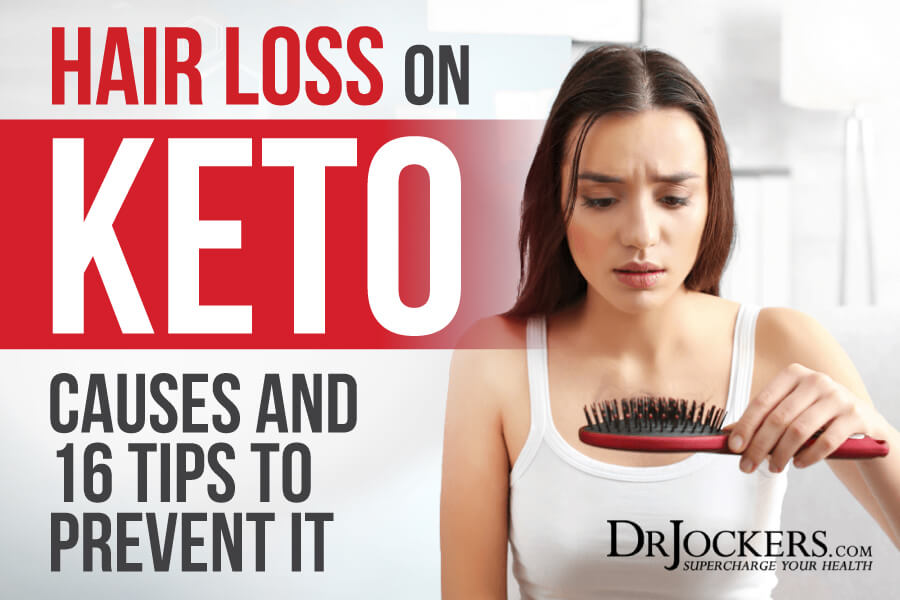 Hair Loss on Keto: Causes and 16 Tips to Prevent It
Hair Loss on Keto: Causes and 16 Tips to Prevent It
Unusual hair loss can be a significant stressor for many women and a sign of an underlying health problem. Many people are turning to the ketogenic diet to improve their health and heal their bodies. This diet and lifestyle has gained popularity as more and more people experience its benefits.
The ketogenic diet is a high healthy fat, moderate protein, low carbohydrate diet. This diet transitions people from being chronic sugar burners to fat burners. Benefits of the ketogenic diet include reducing inflammation, balancing blood sugar, increasing energy, improving mental performance, ending cravings, weight loss, anti-aging and chronic disease prevention. For some people, unwanted hair loss may accompany these benefits.
Hair loss on the ketogenic diet can be due to several factors. Some of these factors include low thyroid function, nutrient deficiencies, hormonal changes, and stress on the body. Fortunately, there are strategies to address hair loss on the ketogenic diet.
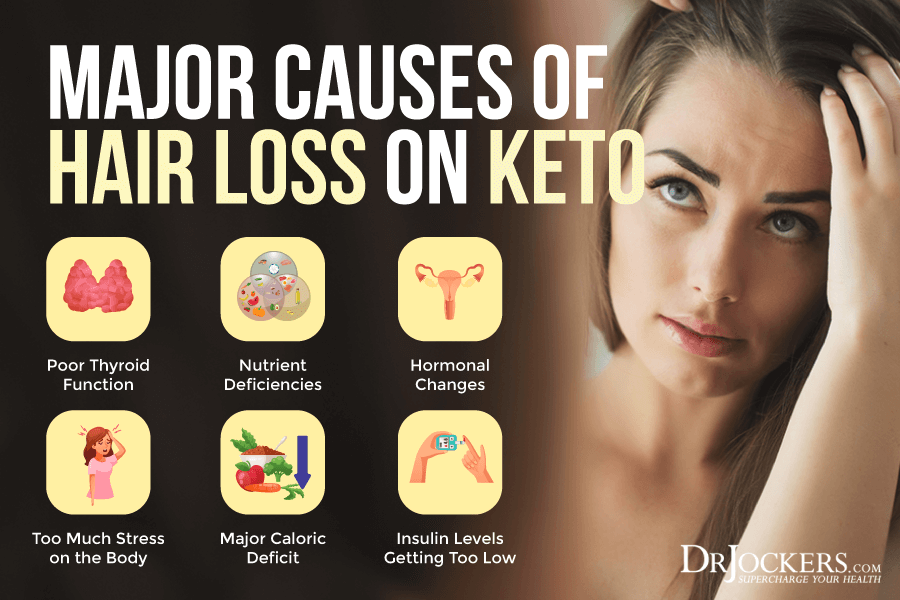
Basics of the Ketogenic Diet
The ketogenic diet is a high fat, low carbohydrate, moderate protein nutrition plan. Around 60-70% of calories are from healthy fats, 20-30% are from protein sources and 5-10% are from net carbs (total carbs minus fiber). This style of eating encourages metabolic flexibility and enables your body to function at a more efficient level.
The ketogenic diet helps your body use fat (stored fat and dietary fat) rather than sugar for fuel. When your body is in ketosis, it produces ketones from fat. Ketones are byproducts of the body breaking down fat for energy. Burning fat for energy is much more efficient and produces less inflammation than burning sugar.
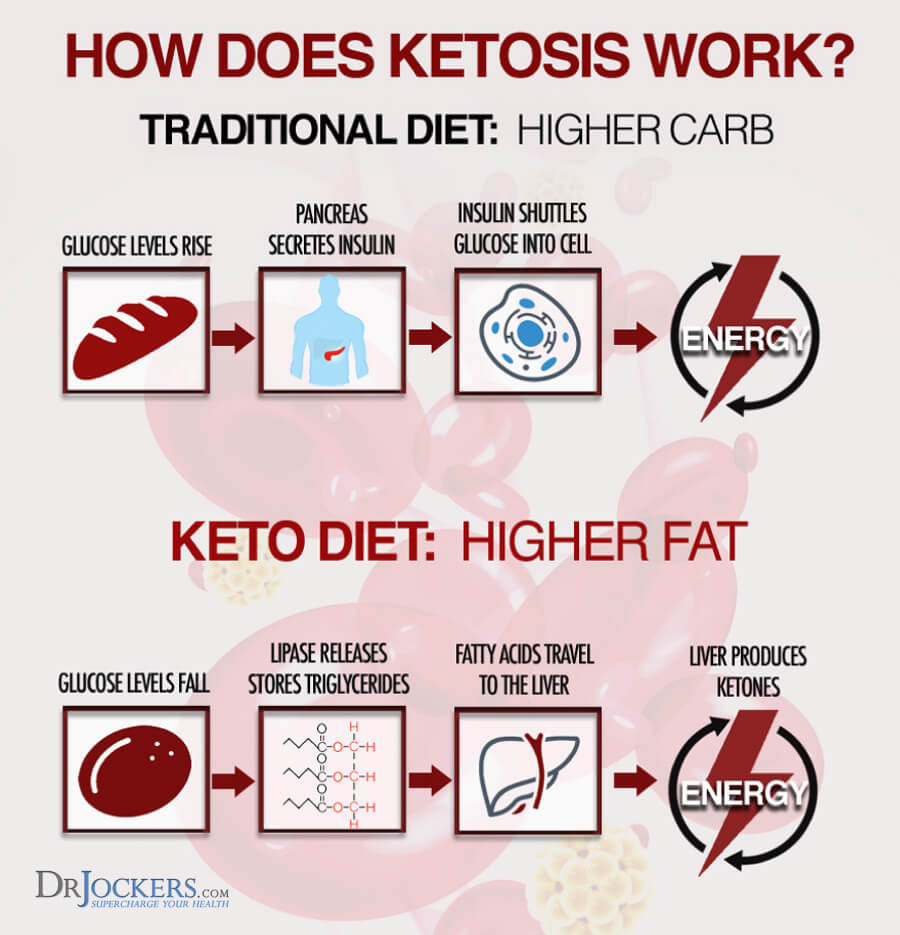
Benefits of the Ketogenic Diet
A low-carb, high-fat ketogenic diet is associated with many health benefits (1). The ketogenic diet lowers inflammation, reduces chronic disease, balances blood sugar levels, increases energy, improves mental performance, ends cravings, helps with fat loss, slows down again, and reduces your risk of chronic disease.
Many people begin following a keto diet for weight loss purposes but they then realize how much better they feel. I personally enjoy this diet and lifestyle because I feel energized and have better mental clarity when I am in ketosis.
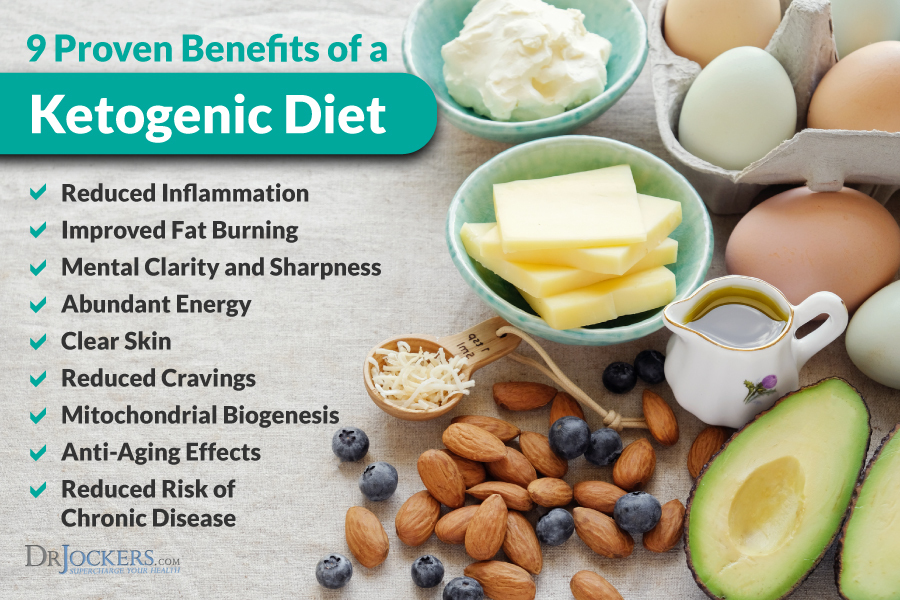
Lowers Inflammation
The ketogenic diet is incredible for lowering inflammation. There is a reduced amount of free radical production when the body is burning ketones for energy instead of glucose. As inflammation is reduced, your body functions more efficiently with more energy production.
Chronic inflammation is caused by free radicals and oxidative stress and is the root cause of most chronic health conditions. By reducing inflammation and improving mitochondrial function, the ketogenic diet allows the body to heal and mitigate disease processes more effectively. This improves many risk factors for metabolic and other chronic diseases.
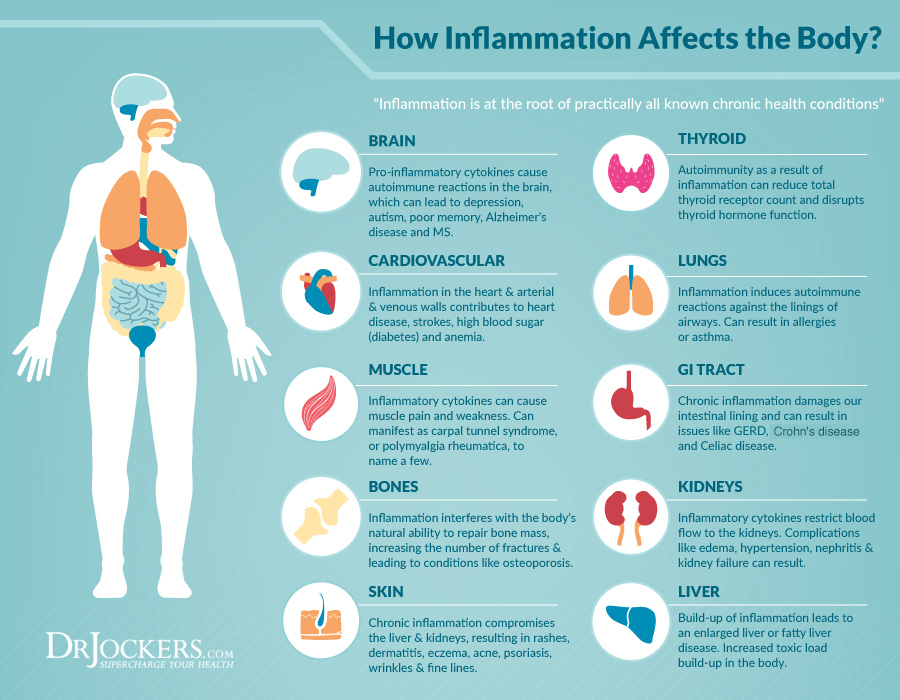
Balances Blood Sugar
A ketogenic diet is excellent for balancing your blood sugar levels. When you consume high glycemic foods, such as refined sugars and carbohydrates, you blood sugar to rises rapidly. Insulin is released from the pancreas to move the sugar from the blood into the cells. This spike in insulin leads to a quick drop in blood sugar and a rise in cortisol.
Massive fluctuations in insulin and cortisol produce inflammatory cytokines that interfere with insulin signaling, resulting in increased insulin resistance and spiked blood sugar. The body produces additional amounts of insulin which leads to inflammation.
Chronically elevated blood sugar creates advanced glycation end products (AGEs). High levels of AGEs damage your tissues by increasing inflammation and promoting oxidative stress. When you are on a ketogenic diet, your blood sugar and insulin levels will decrease and stabilize giving your body a steady source of energy.
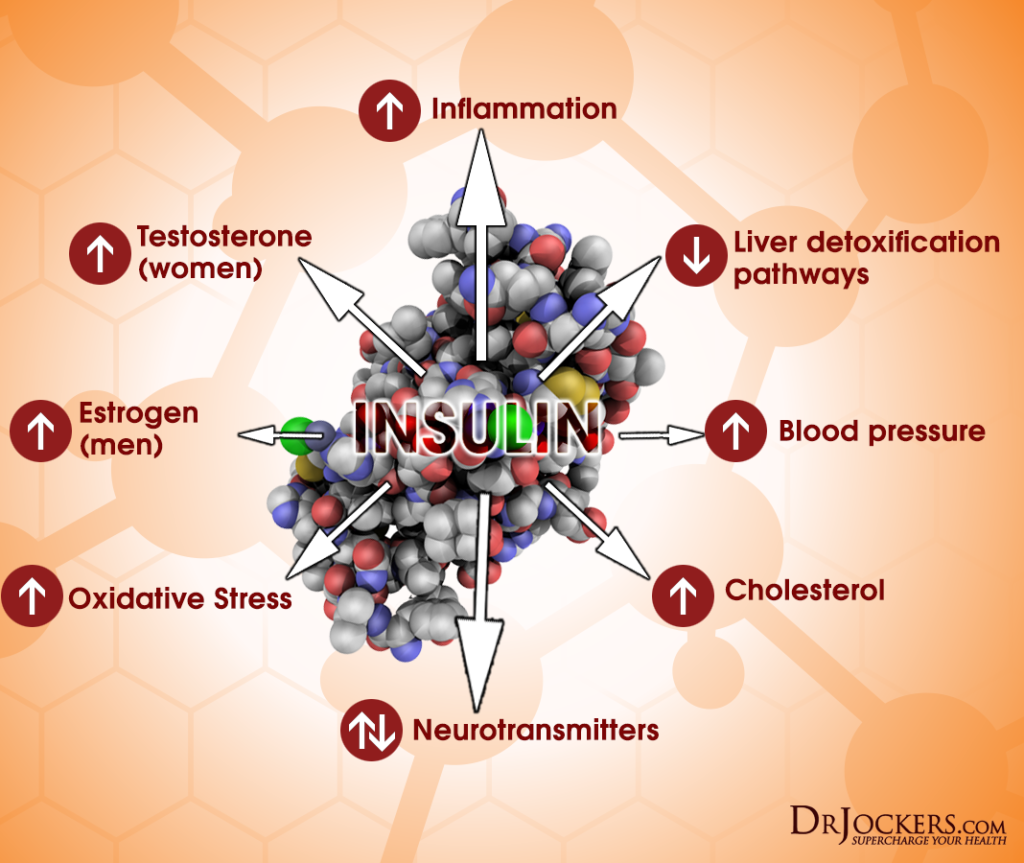
Increases Energy
The ketogenic diet boosts energy by creating the metabolic flexibility to use fat for an energy source. Your body produces significantly more energy from fat as fuel than glucose.
The ketogenic diet also stimulates the growth of new and stronger mitochondria and boosts the production of Adenosine Triphosphate (ATP). Mitochondria are the energy factories in our bodies which produce 90% of cellular energy in the form of ATP, the energy carrying molecule. In addition to producing ATP, your mitochondria maintain glutathione levels, protect DNA, signal cell reproduction, activate cell apoptosis, and maintain cell electrochemical integrity.
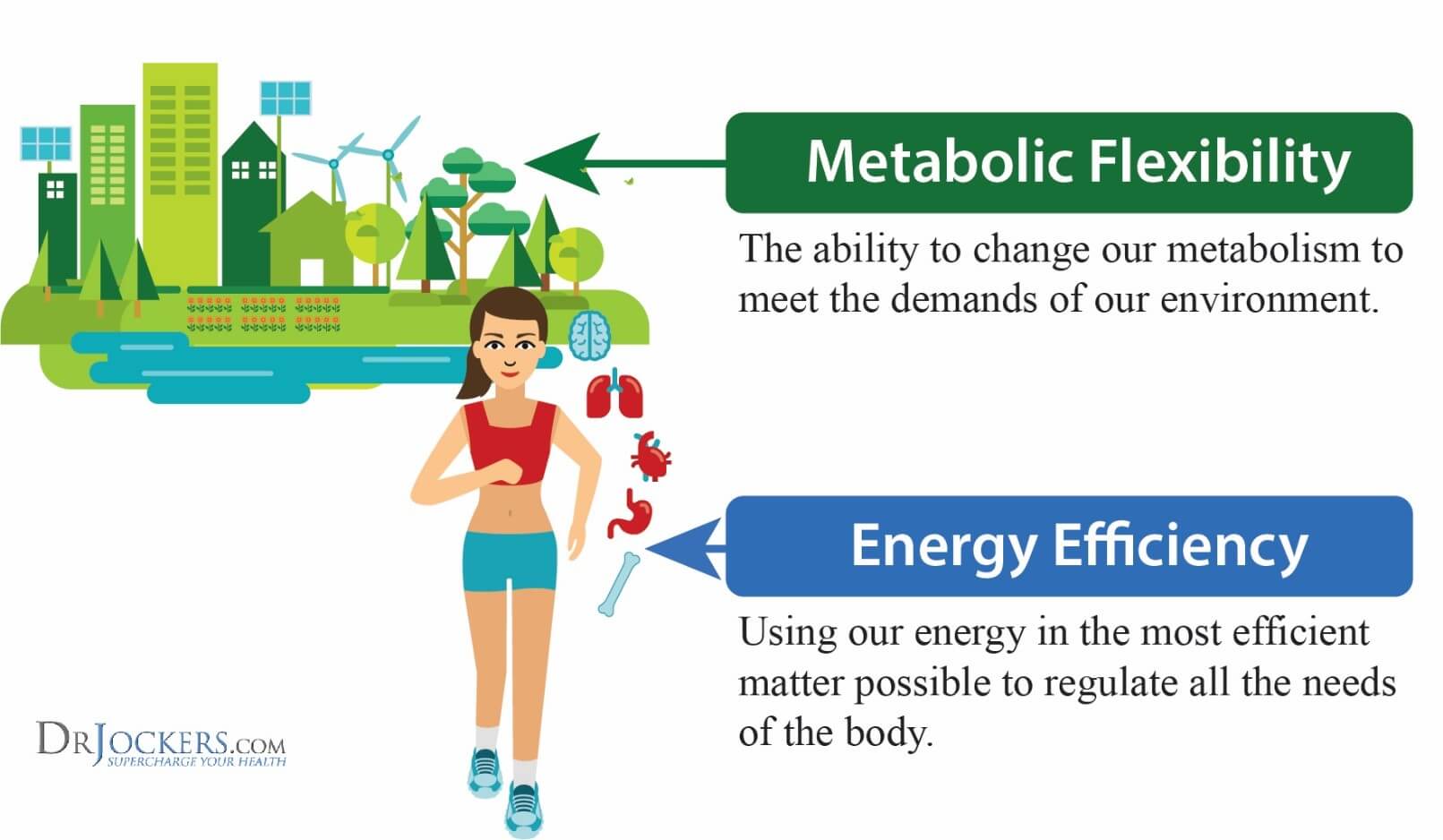
Improves Mental Performance
A healthy brain needs healthy fats. The body uses fat to make new brain tissue and insulation for nerves. Fat also provides the brain with energy improving cognitive performance.
Ketones provide steady, clean fuel to energize brain cells. Additionally, ketones can shut down neuro-inflammatory pathways and stimulate BDNF (brain derived neurotrophic growth factor). Many people notice improved cognitive speed, memory and focus with a ketogenic diet.
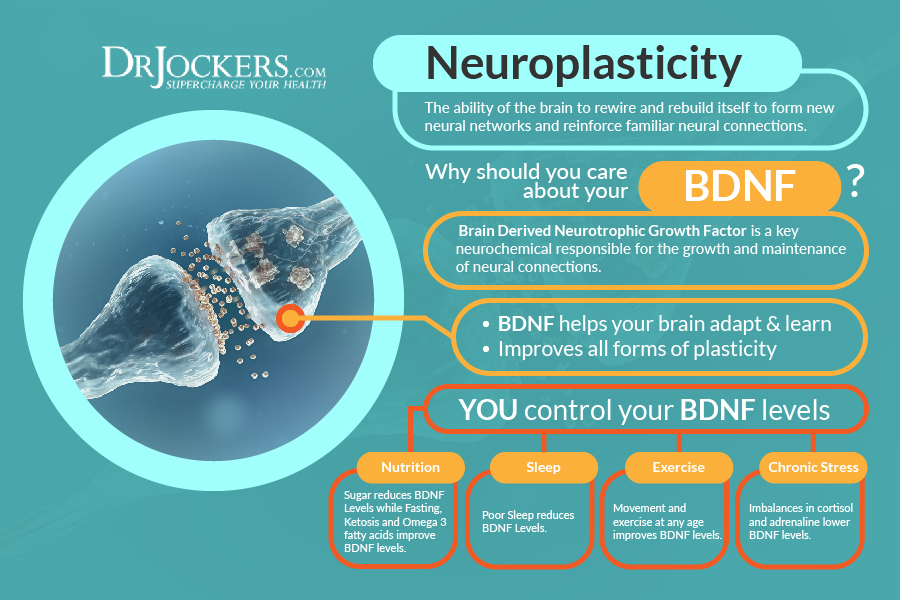
Ends Carb and Sugar Cravings
Chronic blood sugar instability leads to cravings for sugar and refined carbohydrates. Sugar and carbohydrates are very addictive and favored by the body as an energy source. When your blood sugar is unstable, your cravings for these foods increase.
The ketogenic diet helps to break this cycle by giving your body a steady source of energy. Transitioning from a sugar burner to a fat burner with the ketogenic diet can eliminate your cravings for carbohydrates and sugar.
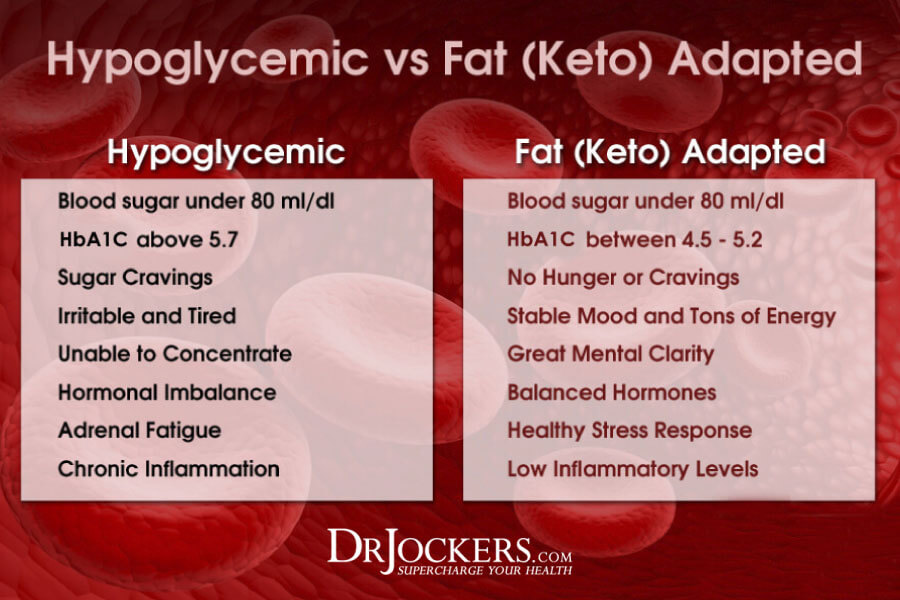
Helps you Lose Weight
A high-fat, low carb diet is superior to a low-fat, high-carb diet for improving weight loss. The ketogenic diet helps you lose excess body fat by burning both dietary fat and stored fat for fuel.
Additionally, the healthy fats, protein, antioxidants, and fiber in the ketogenic diet lead to quicker and longer satiety and less hunger.
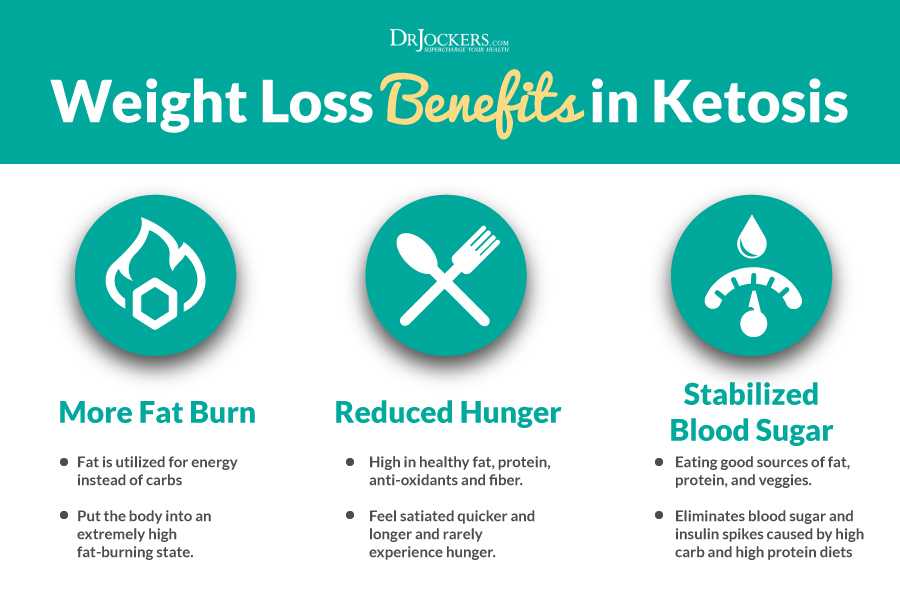
Slows Down the Aging Process
The ketogenic diet has anti-aging and longevity benefits. A recent study found that a ketogenic diet extends longevity and health span (2).
Ketones create more metabolic energy and significantly less free radicals and metabolic waste than glucose metabolism (glycolysis). This is equivalent to a vehicle that gets better performance and gas mileage and creates significantly less exhaust and carbon emissions.
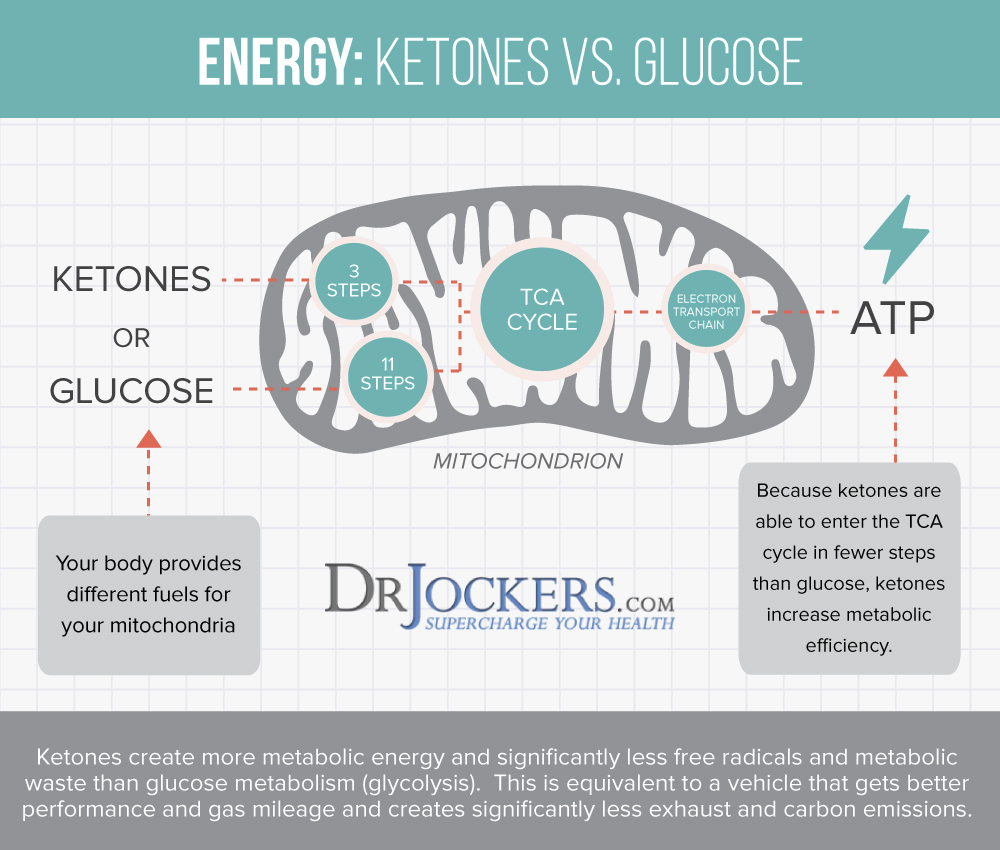
Keto and Your Hair
Before we discuss reasons for hair loss, let’s talk about your hair. Your hair has two separate structures: the follicle and the shaft (3). The follicle resides in your skin. The shaft is the visible part of your hair that surrounds the follicle. Your hair shaft protects your hair and helps it to grow.
The hair growth cycle has three phases:
- Anagen phase: phase of active hair growth that lasts 2-6 years;
- Catagen phase: 2-3 week transitional or intermediate phase during which growth stops; and,
- Telogen phase: resting phase that lasts up to 100 days.
This cycle may be affected by many factors and result in hair loss. Hair loss can significantly impact a person’s self-image and self-esteem. Let’s look at causes of hair loss.
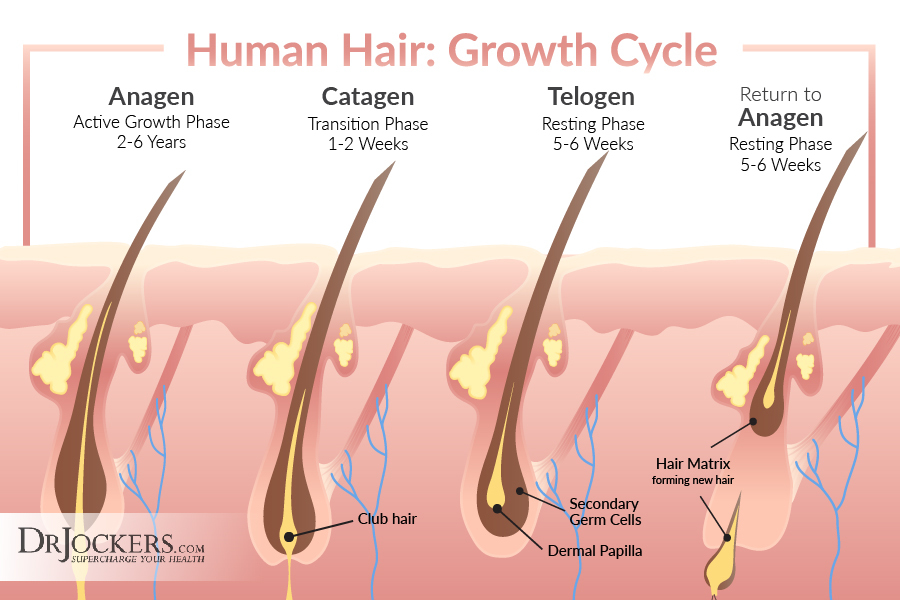
Causes of Hair Loss
We lose around 100 hairs a day as part of the normal hair growth cycle (4). When your hair is falling out more rapidly, it can be due to several factors. Aging and genetic susceptibility are the two most common factors.
Additional causes of hair loss are low thyroid function, anemia, protein deficiencies, hormonal changes, and low vitamin levels. Stress (physical or emotional), chemotherapy and radiation, certain medications, alopecia, fungal infections, and autoimmune conditions can also cause hair loss.
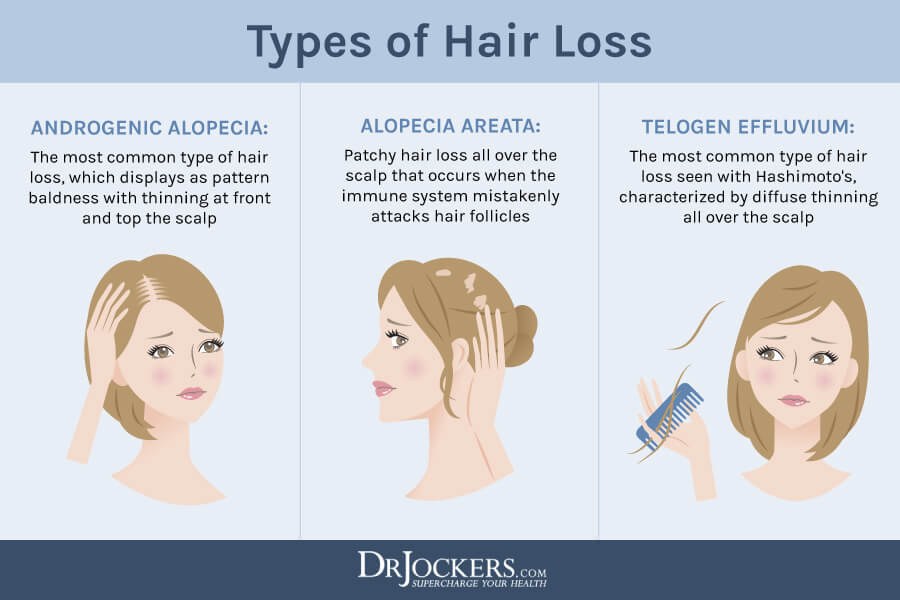
How Your Thyroid Affects Hair Loss
Hair loss while on a ketogenic diet is often related to a thyroid issue. When your body has low thyroid function or thyroid hormone imbalances, hair loss can result.
Thyroid hormones directly alter human hair follicle functions (5). Thyroid hormones regulate mitochondrial function, energy metabolism, and biogenesis of hair follicles (6). Hair follicles are direct targets of the thyroid hormones T4 and T3. Someone with hypothyroidism or underactive thyroid hormone activity may experience hair thinning and hair loss. It is important to support your thyroid and incorporate the following tips if you are experiencing hair loss on the ketogenic diet.
Many hypothyroid conditions are autoimmune in nature, which is called Hashimoto’s thyroiditis. The nature of autoimmune conditions is that if you have one, you are more likely to have autoimmunity effecting other tissues as well. So, someone with Hashimoto’s may also have autoimmune activity toward their hair follicles, which would lead to increased hair loss.
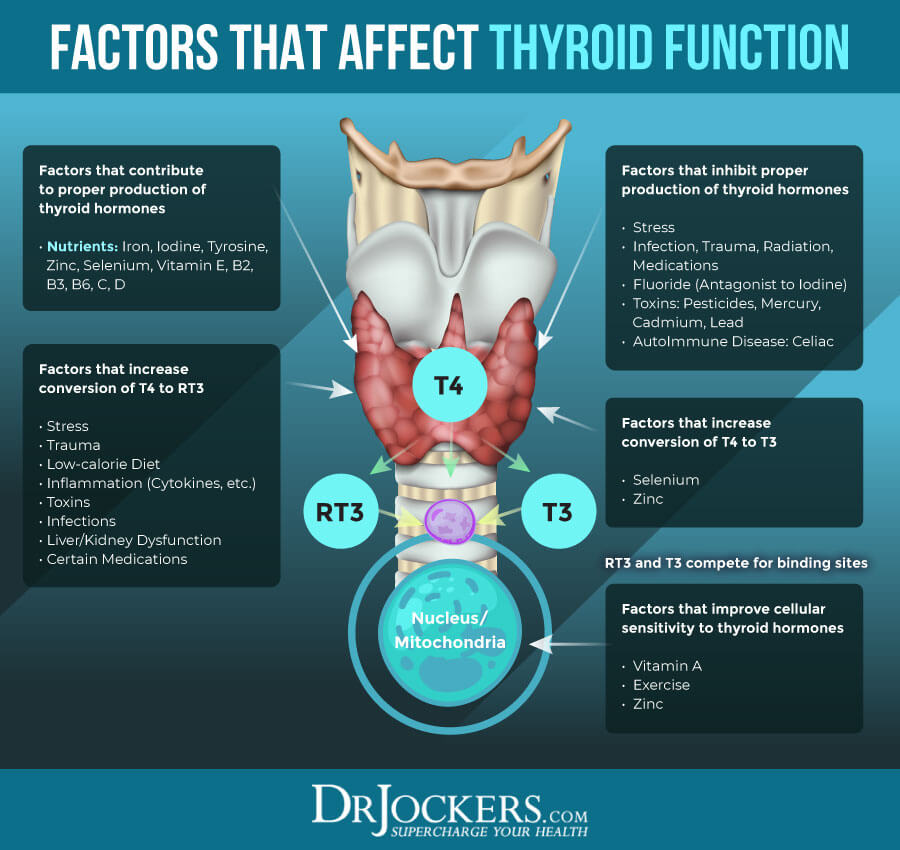
Testing Thyroid Function
Unfortunately hypothyroidism is one of the most under diagnosed conditions in the world. My team of health coaches and I see so many of our coaching clients walking around with very clear symptoms of this condition and yet, there conventional doctors have told them their thyroid is fine.
The truth of the matter is that most conventional doctors do not know how to look for the signs of underactive thyroid hormone in the body and don’t do adequate testing for it. So this leaves you to figure it out on your own. The first thing you can do is look at the image below and see if you have any of these symptoms. If so, or you are experiencing hair loss on keto, than it would be wise to do some testing.
Here are 2 testing options, one you can begin doing at your home right away and the other you can purchase through my website if you choose and get it done at a local blood draw location. I explain these below.
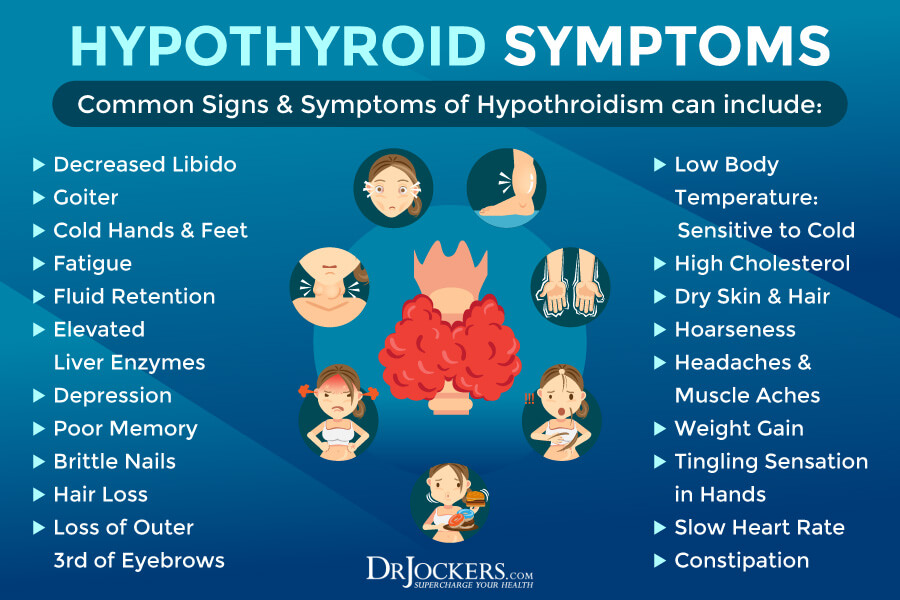
At Home Testing
You can assess your thyroid function by analyzing your body’s basal body temperature (BBT). A low BBT is correlated with low thyroid activity (15). This can be a helpful pre-assessment for thyroid function.
To test your BBT, you test your axillary (underarm) temperature first thing in the morning before getting out of bed. It is best to use an old-fashioned mercury thermometer or Galinstan thermometer. You should hold the thermometer under your arm (with the tip facing the armpit) for 10 minutes and test for four consecutive days.
While standard body temperature is 98.6 degrees, normal underarm temperature is 97.8-98.2 degrees F (36.6-37C) If your temperature is lower than 97.4 degrees, this shows that your cells are not able to produce adequate energy to meet the demands of the body. When your temperature is consistently under 97.4, you likely have low thyroid function. For more information on how to test your thyroid at home with BBT, read this article.
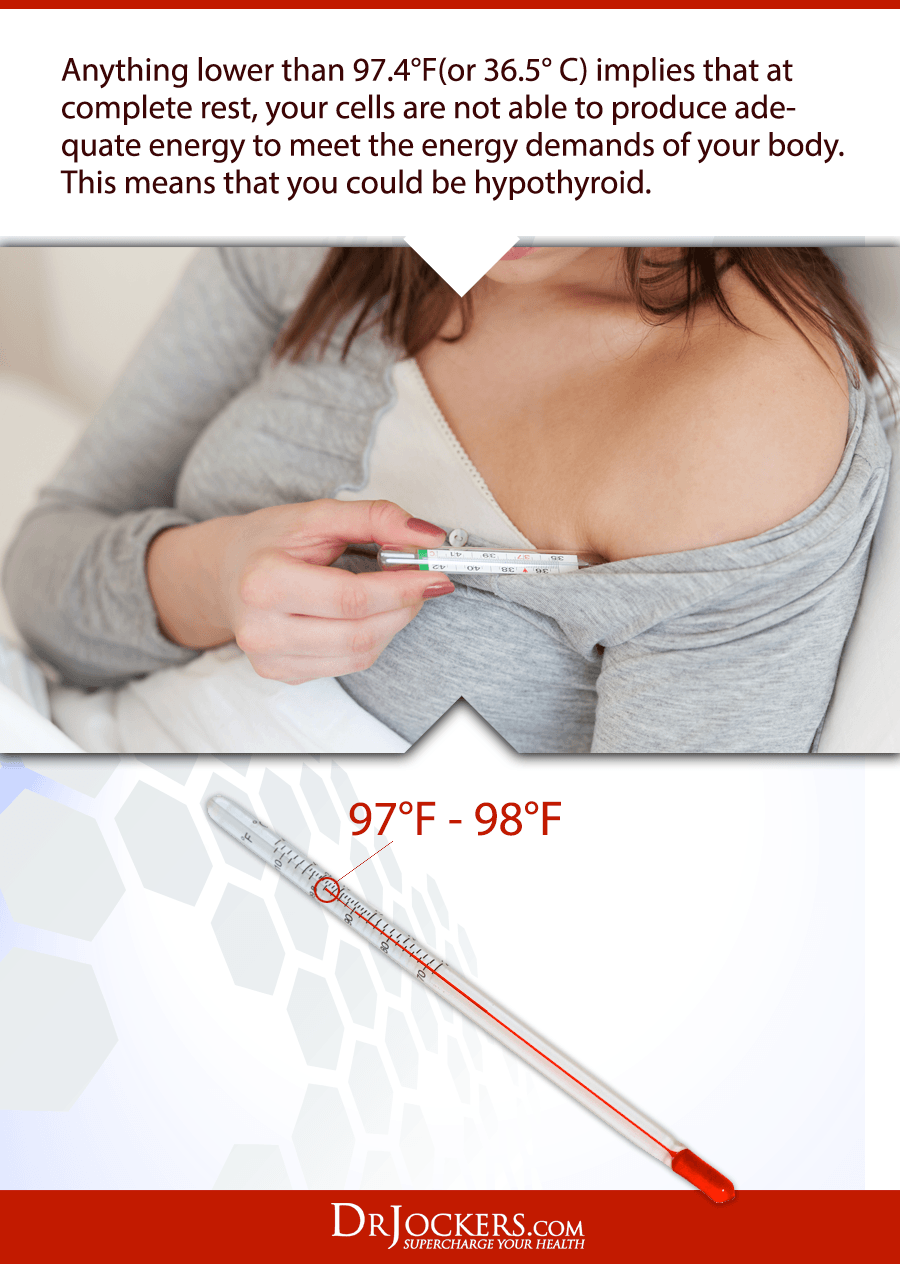
Lab Testing
The Comprehensive blood analysis is a thorough blood test that shows your immune function, thyroid function, blood sugar regulation, liver function, nutritional deficiencies and much more. It includes a Complete Blood Count, Complete Metabolic Panel, Urinalysis, Lipid Panel, and Thyroid Panel.
This comprehensive test can give insight into the reasons you are experiencing hair loss. In addition to a complete picture of your thyroid function, this test measures your iron levels, vitamin D level, liver function, magnesium levels, and much more. More information about the Comprehensive Blood Analysis can be found here.
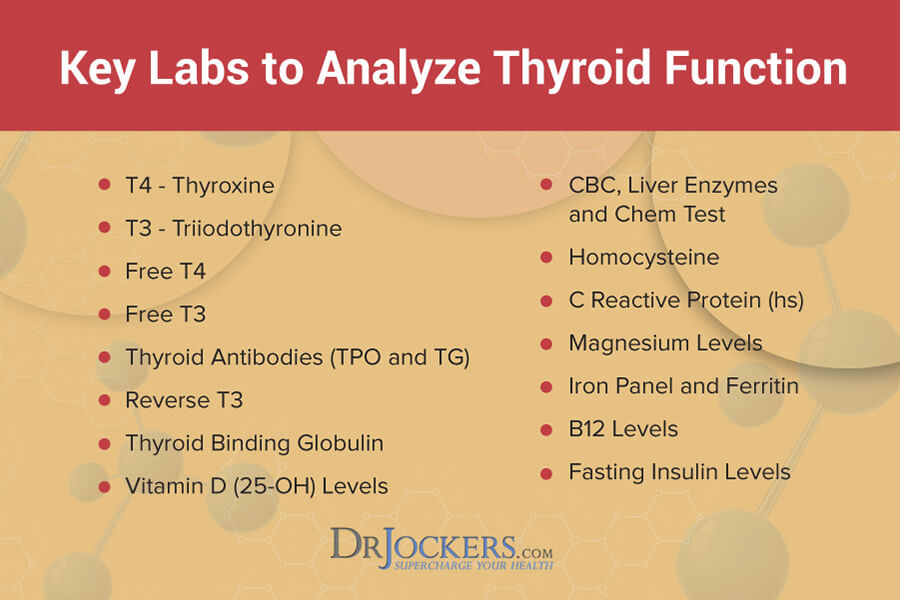
Tips for Reducing Hair Loss on the Ketogenic Diet
Cycling carbohydrates, eating enough calories, consuming plenty of healthy fats, and correcting nutritional deficiencies can reduce or prevent hair loss. Other strategies are avoiding toxins, using essential oils, supporting digestion, super hydrating, using glandular and herbal thyroid support, supplementing with collagen, and supporting your liver.
You can perform an at home basal body temperature test to help determine whether a thyroid issue is contributing to your hair loss. It is important to follow up with lab testing to measure your thyroid levels. Lab testing can reveal other underlying factors like low iron that may be causing your hair loss. Performing the Comprehensive Blood Analysis is important if you are losing hair on the ketogenic diet.
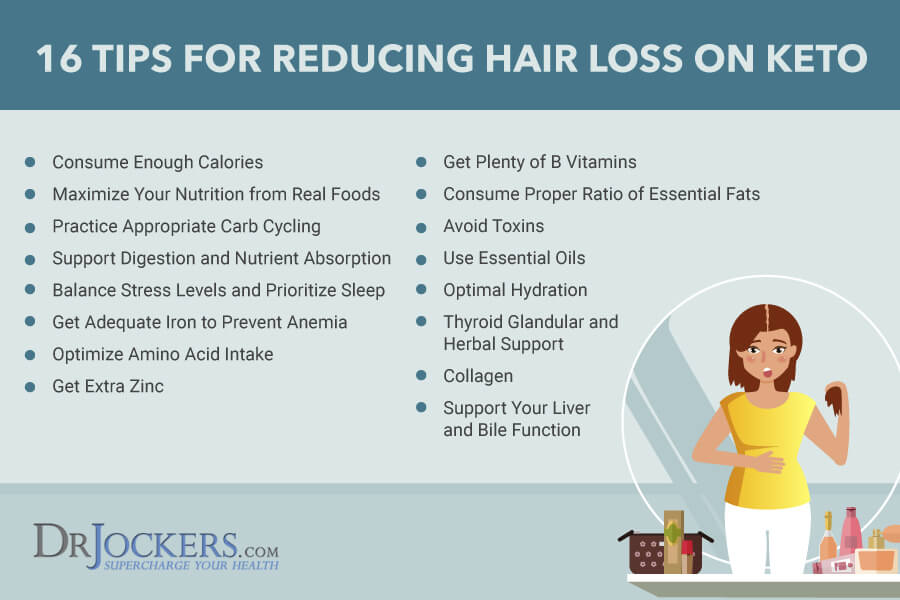
Eat Enough Calories
One of the most common ketogenic diet mistakes is not eating enough calories. Prolonged calorie restriction is very stressful on the body. This causes stress on the body which signals the hair follicles to move into an inactive stage and can lead to hair loss.
When you are not consuming enough calories, your body will start to conserve energy. Your body will spend less energy on non-vital functions such as hair growth. Calorie restriction also leads to adrenal and thyroid problems which can exacerbate hair loss.
To prevent hair loss, be sure to consume enough calories while on the ketogenic diet, especially from healthy fats. Healthy fats should be a major portion of every meal.
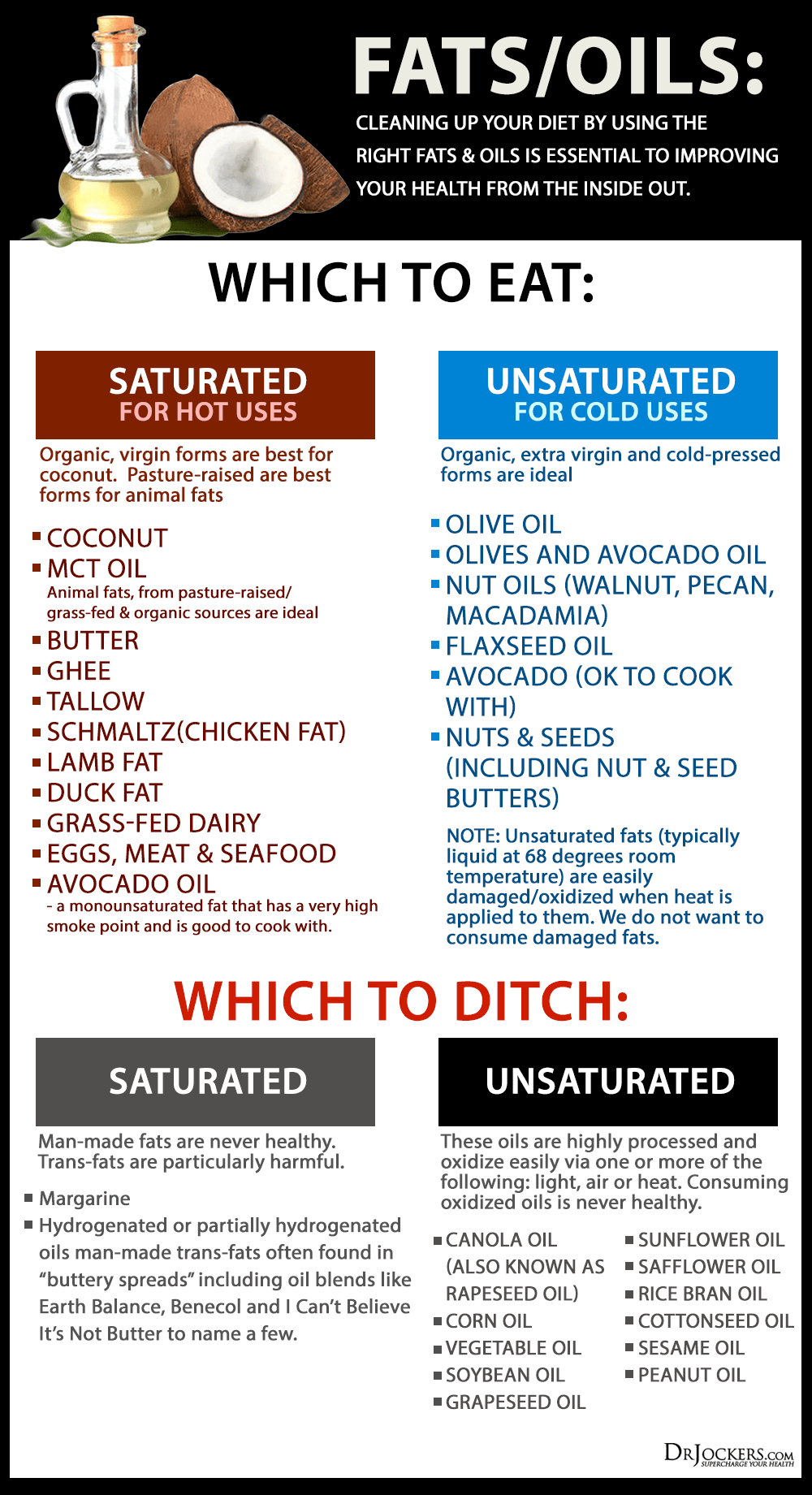
Maximize Nutrition
Our hair thrives on a diet rich in vitamins, minerals, and antioxidants. It is important to maximize your intake of nutrient-dense foods. If your hair is deprived of nutrients, this negatively impacts hair growth and can lead to excessive shedding.
There are many nutrients that are important for preventing hair loss and necessary for the proper production of thyroid hormones. Important nutrients include iron, amino acids, iodine, tyrosine, zinc, selenium, and vitamins A, C, D, E, and B vitamins. It is important to obtain these nutrients while on the ketogenic diet by consuming healthy fats, clean protein sources, and organic, anti-oxidant rich vegetables and herbs.
A great way to make sure you are getting optimal amounts of vitamins and minerals is by supplementing. High Energy Support is a multivitamin/mineral formula with a balanced profile of nutrients. The micronutrients in High Energy Support are provided in bioavailable form so they can be better absorbed and utilized. Let’s look more closely at some of these important nutrients for healthy hair and thyroid function.
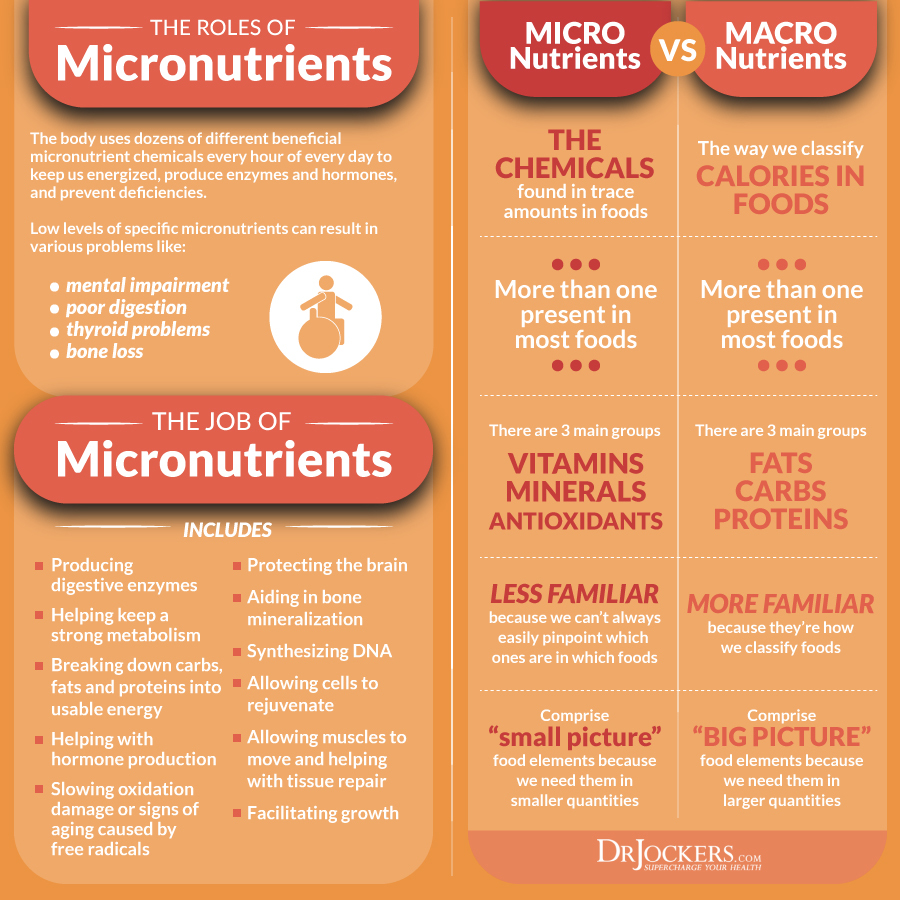
Carb Cycling on the Ketogenic Diet
While eating a low carbohydrate diet, your body is more sensitive to insulin and is more metabolically efficient. This is positive for your body, but problems can arise when you eat a low-carbohydrate diet for too long.
Over long periods of restricting carbohydrates, your thyroid hormones may drop, you may become less sensitive to insulin, and you may gain weight. Lowered production of thyroid hormones can cause hair loss. Cycling carbohydrates into your ketogenic diet remedies this problem.
Carb cycling is alternating periods of lower and higher carbohydrate content in your diet. This helps to optimize your body’s metabolic needs.
There are different ways to cycle carbohydrates. You can eat low-carb for 3 days, higher-carb for 1 day, low-carb for 3 days, or low-carb for 6 days and higher-carb for 1 day. Everyone has unique bio-individual needs so it is important to listen to your body.
An example of carb cycling is to consume 50 or fewer grams of carbohydrates on most days. On the higher-carbohydrate days, you would consume around 80-150 grams of carbohydrates. If you don’t feel as good with the high carbs, you could also do a very high protein day each week or multiple times each week and see how you feel with that. For more information on how to follow a cyclical ketogenic diet, check out this article.
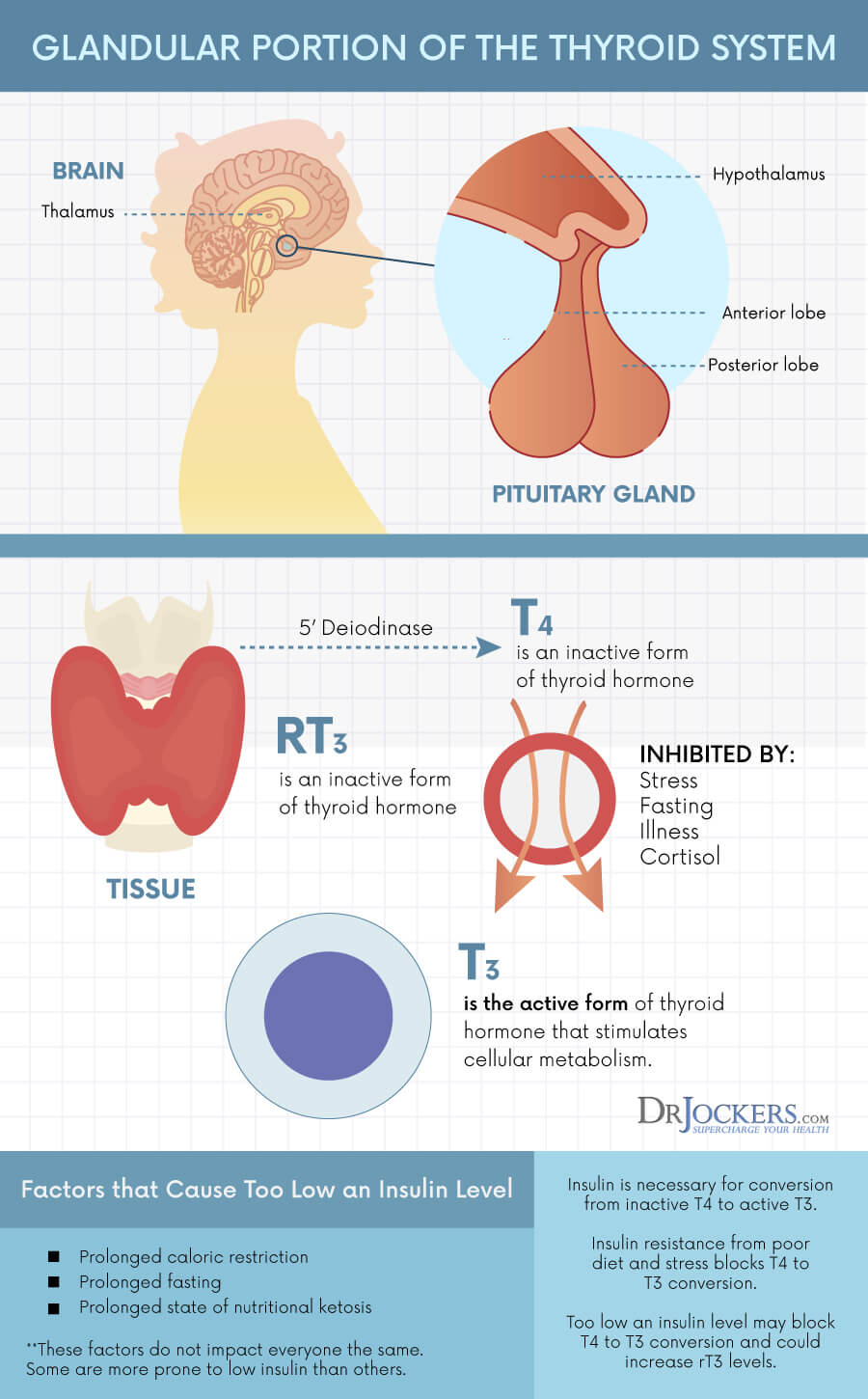
Consider an AutoImmune Approach
Hair loss and thyroid issues are often associated with autoimmune activity in the body. Individuals with an autoimmune condition seem to do best when they eliminate some of the more common immune reactive foods. A keto diet eliminates many of these already since it is grain and sugar free. The keto foods that are more commonly immune triggering include dairy, eggs, nuts, seeds and nightshade vegetables.
To replace these foods, we would add in more coconut fats, bone broth, fermented veggies, green leafy veggies, avocados, olives and olive oil. In addition to this, it would include several of the world’s most anti-inflammatory herbs and nutrients. These foods tend to reduce inflammation in the body and support healthy bone and joint structure. For more info on the autoimmune nutrition plan read this article.
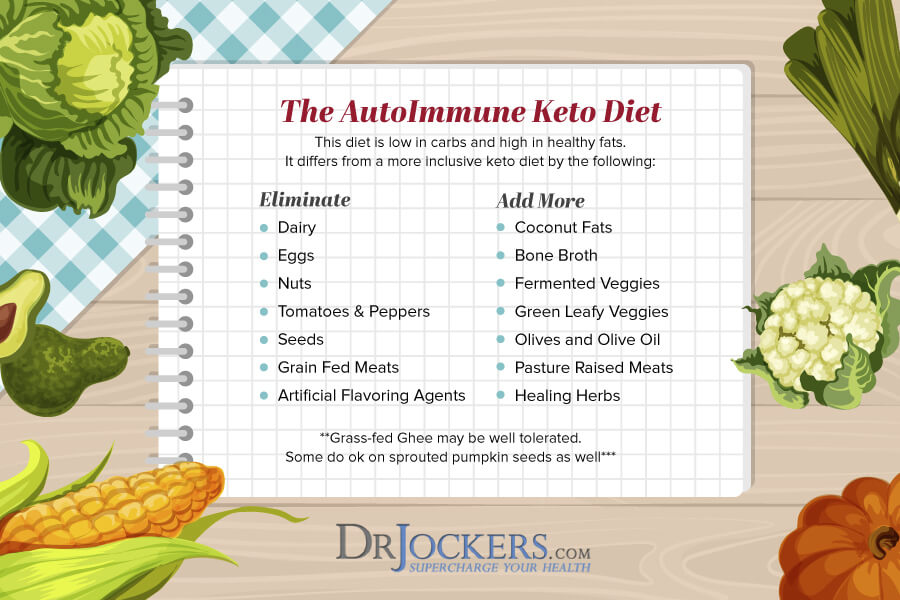
Support Digestion and Nutrient Absorption
It is critical to support your digestive system on a ketogenic diet. Optimizing digestion and the absorption of nutrients is important for preventing hair loss.
Digestive enzymes help with the chemical breakdown of food into smaller, absorbable components. Enzymes are key for breaking down carbohydrates, protein and fatty acids. This prepares these macronutrients for proper digestion and assimilation in the body.
An excellent supplement for optimizing digestion and nutrient absorption on the ketogenic diet is Super Digest HCL which contains betaine HCL for stomach acid support, bile for fat digestion and pancreatic enzymes. This powerful blend supports the digestion of fats, proteins, carbohydrates, and fiber. This can maximize the benefits of the ketogenic diet and prevent hair loss.
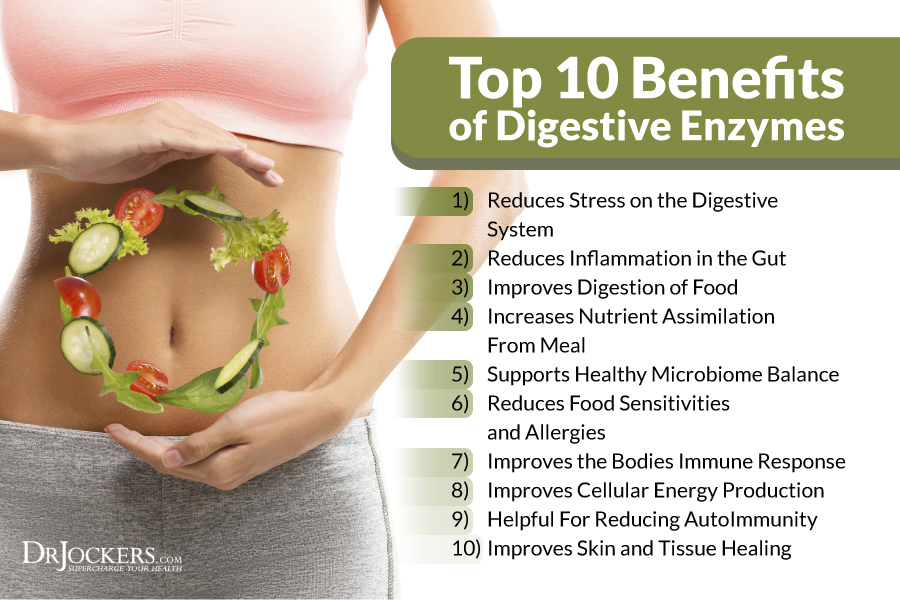
Balance Stress Levels and Prioritize Sleep
One of the biggest disrupting agents for good thyroid hormone activity in the body is high amounts of stress coupled with inadequate or poor quality sleep. I see way too many people begin a ketogenic lifestyle but also be engaging in a lot of high intensity exercise, be staying up way too late at night and have a high stress daily life taking care of young children, having financial pressure or job/career stress.
It is really important to keep stress levels under control and prioritizing sleep as much as possible. I recommend setting a digital curfew and doing your best to be in bed by 10pm and getting at least 7 and in some cases 8-9 hours of quality sleep each night. Here is a helpful article that goes over some great strategies to improve your sleep quality and another article here that goes over key nutrients to support good sleep.
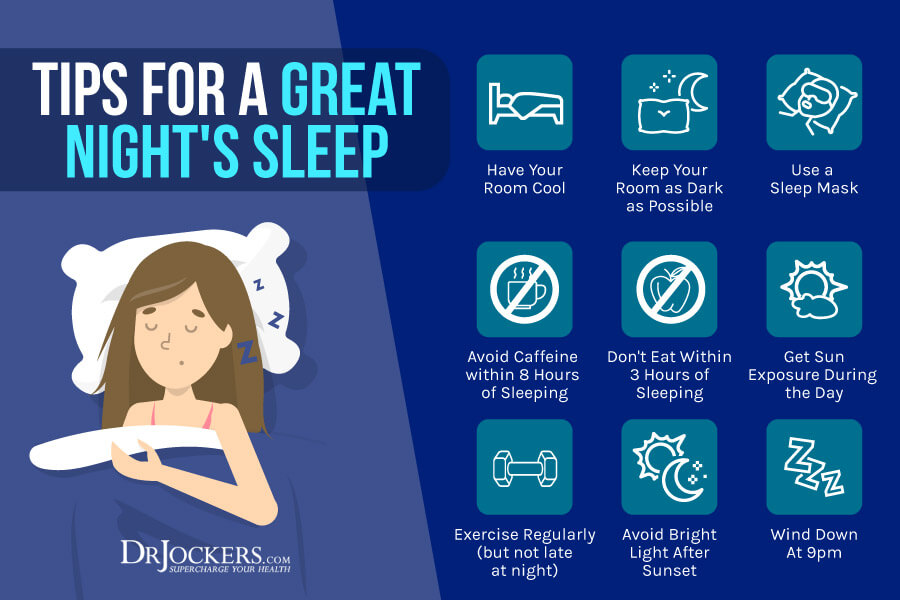
Iron
Low iron levels are associated with hair loss (7). Iron is necessary for transporting oxygen around the body, including to hair follicles, and producing energy. Iron helps increase circulation in the scalp which fuels hair growth.
Symptoms of iron deficiency are fatigue, irritability, difficulty concentrating, headaches, coldness in the hands and feet, and brain fog. Common causes of iron deficiency are a poor diet, blood loss, the decreased ability to absorb iron, and pregnancy.
If your lab results show low iron levels, you may need supplemental iron. Iron Power contains iron bis-glycinate, a gentler form of iron with less gastrointestinal side effects. This form is shown to have higher rates of absorbability and results in faster increases in iron measures such as serum ferritin.
Amino Acids
Amino acids are the building blocks of protein. Protein is important for hair growth and helps repair and strengthen hair follicles. Deficiencies in amino acids are associated with hair loss. The amino acids histidine, leucine, l-lysine, valine, alanine and cysteine have been found to be deficient in men and women with hair loss regardless of type (8).
Supplementing with Amino Strong is an excellent way to boost your levels of nine essential amino acids. Amino strong improves mitochondrial function and keto adaptation. This article has more information on reasons for amino acid deficiencies.
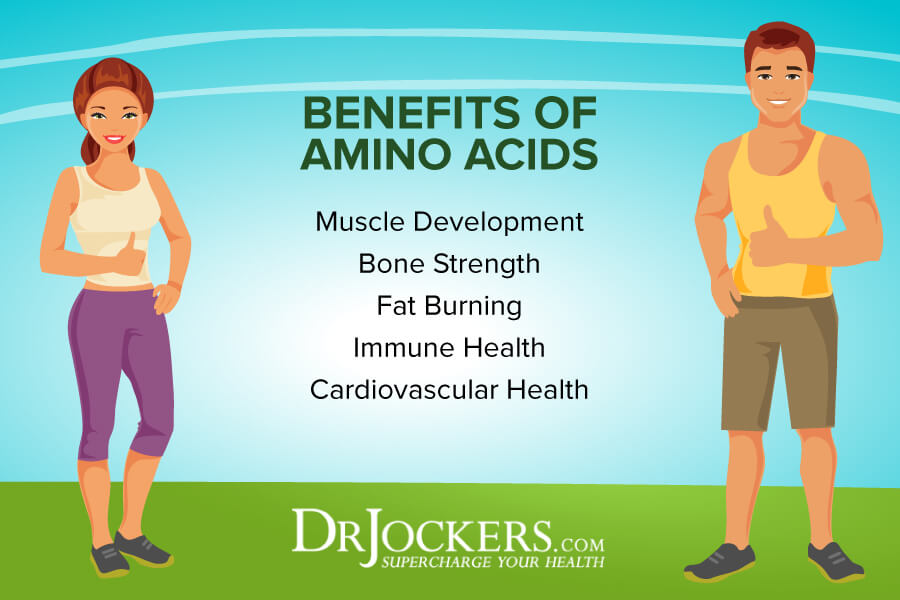
Zinc
Zinc is an important mineral that plays a major role in various physiological processes. It helps support hair growth and the repair cycle. It also contributes to proper production of thyroid hormones, increases conversion of T4 to T3, and improves cellular sensitivity to thyroid hormones.
Good dietary sources of zinc include grass-fed beef and dairy, salmon, chicken, spinach, and asparagus. Nuts and seeds such as cashews, almonds, pumpkin seeds, and watermelon seeds are also high in zinc. It is best to soak or sprout nuts and seeds to reduce the level of phytic acids which can adversely affect zinc levels.
If you are deficient in zinc, supplementation can have a therapeutic effect on hair loss (9). Zinc Charge is a high-potency source of zinc formulated for enhanced absorption. Zinc Charge supports your immune system and proper enzymatic function.
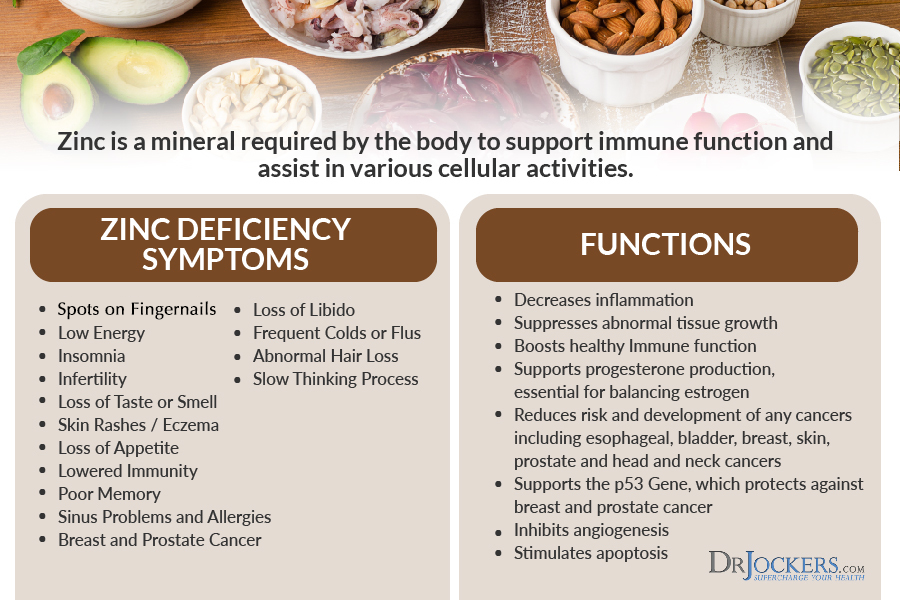
B Vitamins
B vitamins are important nutrients for your hair, skin and nails. Without adequate amounts of B vitamins, the ability of your mitochondria to generate energy will be diminished which can contribute to hair loss.
Niacin and biotin are B vitamins that are especially important for your hair. Niacin (vitamin B3) promotes blood circulation to your scalp encouraging hair growth. Biotin (vitamin B7) helps convert food into fuel and keeps your hair, skin, and nails healthy.
Deficiencies in biotin lead to dry, brittle hair and hair loss. The ketogenic diet increases biotin bioavailability so people on the ketogenic diet may have an increased biotin requirement (10).
Foods that are rich in B vitamins include beans and peas, beef, wild-caught fish, pastured chicken and turkey, green leafy vegetables, dairy and eggs. Supplementation with a high-quality B complex is a great way to ensure you have optimal amounts of these important vitamins.
B Strong is a vitamin B complex which includes niacin and biotin along with vitamins B1, B2, B5, B6, B9 (folate), and B12 (as methyl-cobalamin). This combination of B vitamins supports mitochondrial and adrenal function and may help with hair loss.
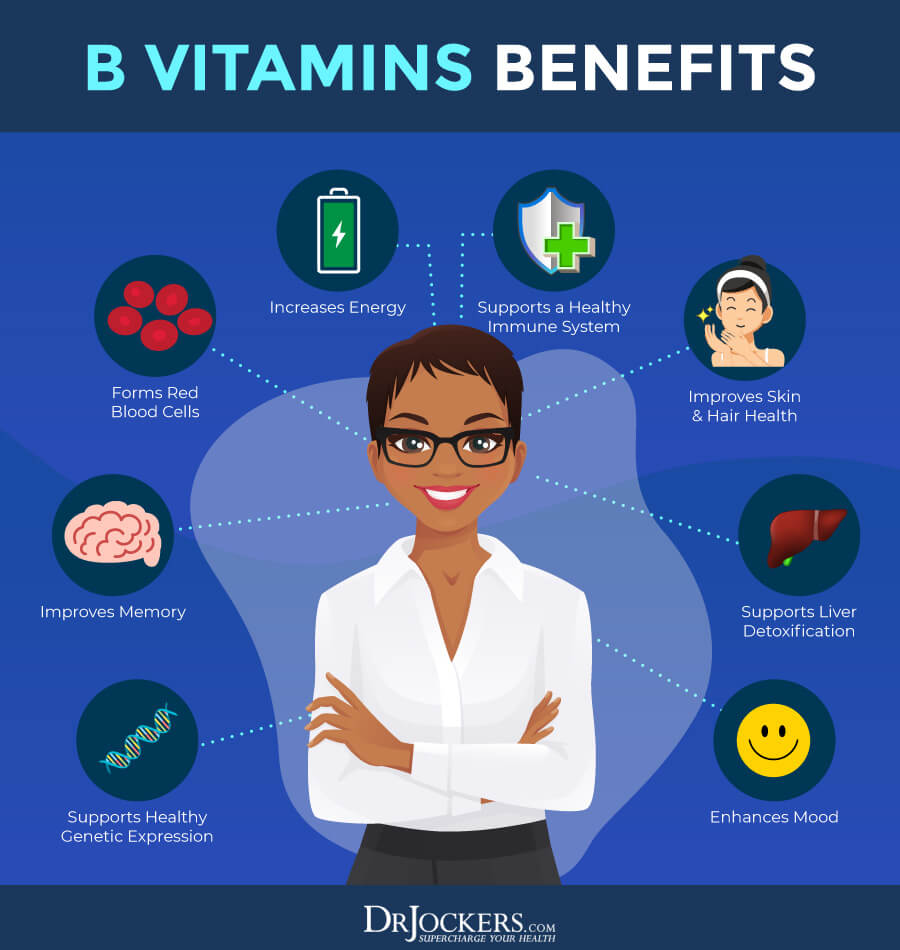
Consume Plenty of Healthy Fats
Essential fatty acids play a big role in hair growth. Omega-3 fatty acids are essential fats that help reduce inflammation and regulate hormone production. It is important to have the ideal ratio of omega-6 to omega-3 fatty acids in your diet which is 1:1 to 4:1.
Supplementing with omega-3 and omega-6 fatty acids along with antioxidants has been shown to reduce hair loss and improve hair diameter and density by around 90% (11). Omega-3 fatty acids can also help with hair loss by increasing thyroid hormone signaling pathways in the liver (12).
A great way to get the proper balance of omega-3 and omega-6 fatty acids is with ProEPA with GLA. ProEPA with GLA contains 257 mg of GLA (gamma linoleic acid), a critical omega-6 fatty acid with numerous health benefits. It also contains the essential omega-3 fatty acids EPA and DHA. This supplement provides both omega-3 and omega-6 fatty acids for reducing hair loss.

Avoid Toxins
Endocrine disrupting compounds (EDCs) are toxins like pesticides, polychlorinated biphenyls (PCBs), parabens, and phthalates. EDCs burden your liver and kidneys, wreak havoc on your hormones, and impair thyroid function. Exposure to these toxins can contribute to hair loss.
To avoid these toxins, the foods you consume on the ketogenic diet should be organic vegetables and fruits, grass-fed beef and dairy, pastured organic chicken, and healthy fats like avocados, olives and coconuts. Conventionally-raised meats and animal products, vegetables and fruits grown with pesticides or herbicides, and processed vegetable oils are extremely toxic.
You should also avoid plastics and Bisphenol A (BPA), which contain xenoestrogenic chemicals. Check your personal care products for parabens, phthalates, and other chemicals. It is critical for healthy hair and optimal thyroid function to minimize your exposure to EDCs.
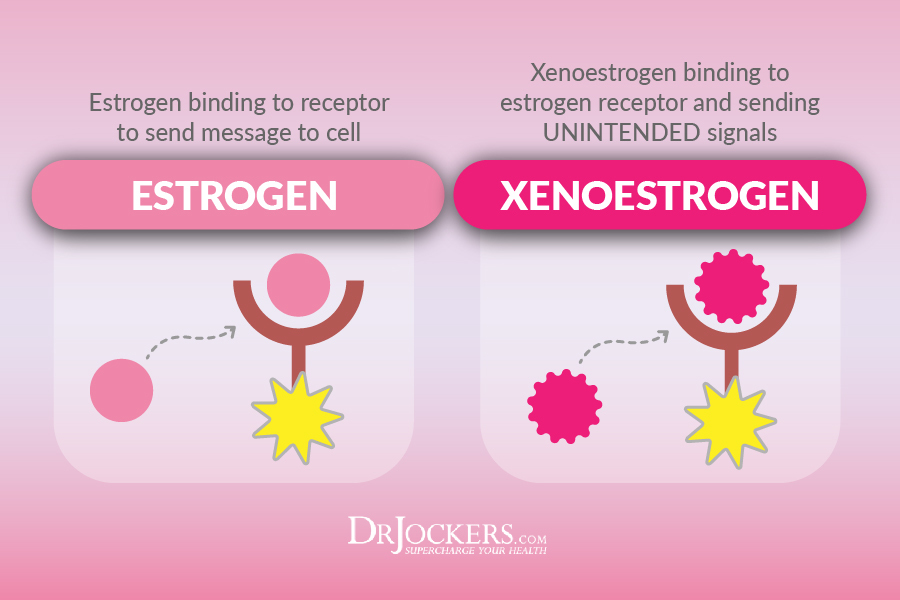
Use Essential Oils
Essential oils like rosemary, cedarwood, peppermint, lavender, and sage promote hair growth. Rosemary has very high antioxidant activity and has numerous health benefits. It increases cellular metabolism that stimulates hair growth. In fact, rosemary was found to be as effective as the conventional treatment minoxidil for hair loss with less itching (13).
Cedarwood increases circulation to the scalp which stimulates hair follicles. Peppermint also stimulates the scalp and has been found to significantly increase hair growth (14).
A great way to use these oils is to mix them with olive, jojoba, or coconut oil and massage into your scalp to stimulate hair growth. Coconut oil has essential nutrients including lauric acid which penetrates the hair shaft and improves the health of your hair.
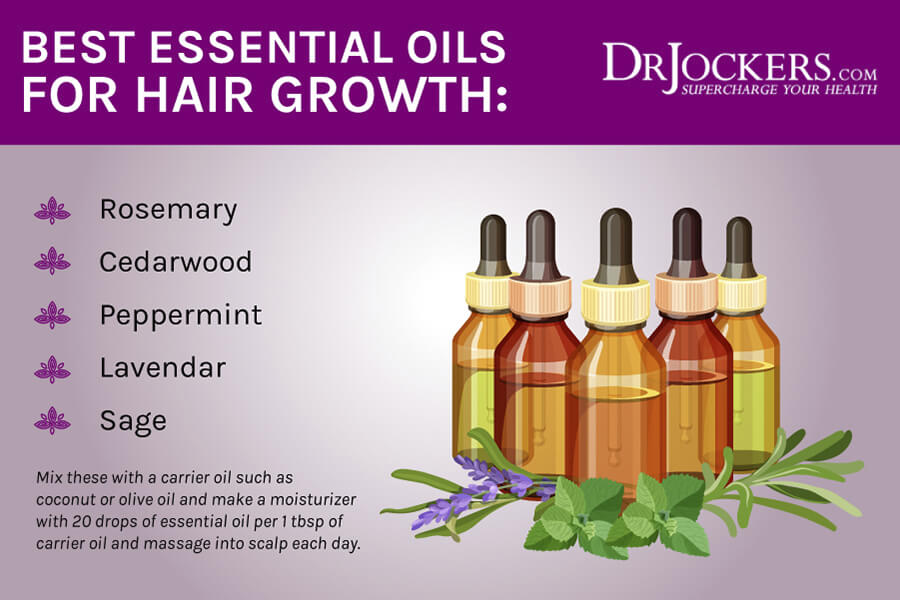
Optimal Hydration
Optimal hydration is critical for people on a ketogenic diet and can help prevent hair loss. The hair shaft is 25% water. When hair is dehydrated, it becomes brittle and weak. Water hydrates the body and helps to regulate the circulatory system, feeding the hair follicle and stimulating hair growth.
To stay hydrated on a ketogenic diet, drink at least half of your body weight in water. For example, a 130-pound individual should consume a minimum of 65 ounces and up to 130 ounces of water per day. A great strategy is to super hydrate first thing in the morning with clean, filtered water.

Glandular and Herbal Support
Adaptogenic herbs like ashwaghanda and lemon balm can help balance stress hormones and improve thyroid hormone expression. Bovine glandulars with thyroid elements and nutrients support thyroid hormone production and utilization.
Thyroid Strong is a comprehensive freeze-dried, BSE-free, bovine multiglandar formula to support thyroid health. It contains minerals and herbs that strengthen thyroid function. Using Thyroid Strong to support your thyroid can help prevent hair loss while on the ketogenic diet.
Collagen
Collagen is essential for healthy hair. Collagen is a structural protein and the most abundant protein in our bodies. It is part of your hair follicle stem cells, which help create new hair. The collagen in your hair also gives it structure and healthy bounce. When there is not enough collagen, hair is weak, brittle, and dull. Deficiencies in collagen can cause hair loss.
As we age, our bodies produce less collagen. Supplementing with a high-quality, organic collagen powder is an excellent way of ensuring you have optimal levels of collagen. One of the best collagen supplements on the market is Multi Collagen Protein. This concentrated collagen powder provides 9 grams of collagen per scoop.
Support the Liver and Bile
Supporting the liver can help prevent hair loss. Your liver helps metabolize fats, carbohydrates, and protein. It also produces bile which is essential for digesting and absorbing fats in our diet.
The liver regulates and directs hormones to perform their proper function. Conversion of the thyroid hormone T4 to the active form T3 occurs in the liver, so it is important for thyroid function to support the liver.
On the Comprehensive Blood Analysis, we look at liver enzymes such as AST, ALT, GGT and Alkaline Phosphatase. These can indicate a liver issue and another sign to look out for would be tiredness after eating a fatty keto meal and stools that float. If you have had gallstones in the past or have had your gallbladder removed, it is super important to support your liver for good bile flow.
I would highly recommend reading this article to optimize bile flow and this article on top strategies to support liver and gallbladder. If you have had your gallbladder removed, you can still successfully do keto and I explain that in this article
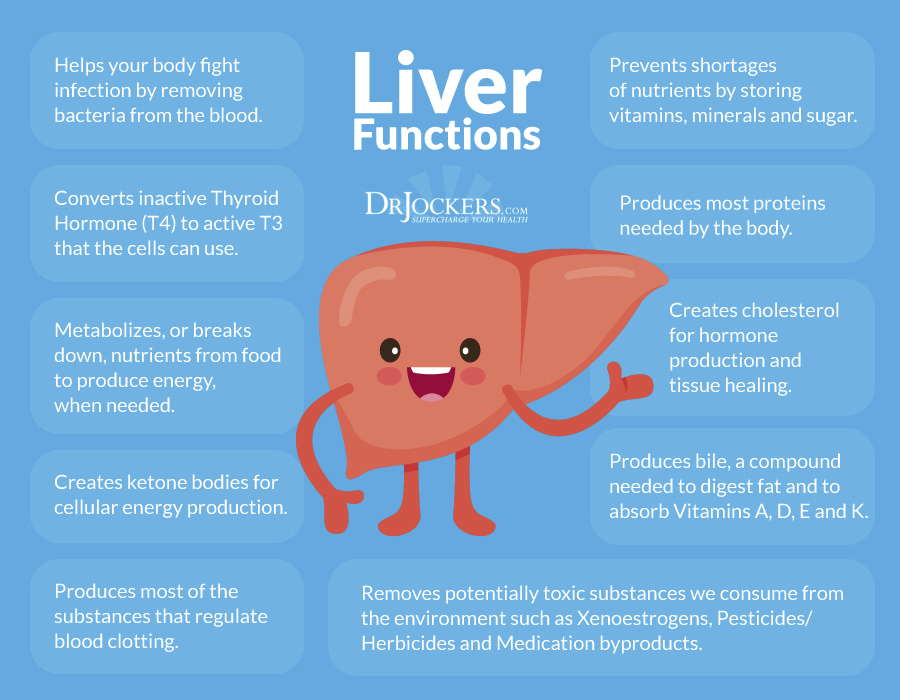
Conclusion
The ketogenic diet is a high-fat, low-carb, moderate-protein diet that influences the metabolism to promote fat burning over sugar burning. The ketogenic diet lowers inflammation, balances blood sugar levels, improves mental performance, boosts energy, ends cravings, helps with fat loss, slows down again, and reduces your risk of chronic disease.
Some people experience hair loss while on a ketogenic diet. However, there are remedies for this hair loss. Carb cycling, eating enough calories, maximizing nutrient intake, consuming plenty of healthy fats, avoiding toxins, using essential oils, supporting digestion, hydrating, using glandular and herbal thyroid support, collagen supplementation, and supporting your liver are tips for preventing hair loss while on the ketogenic diet.
At home and lab testing can reveal what may be causing your hair loss. Performing these tests regularly is important if you are losing hair while on the ketogenic diet.





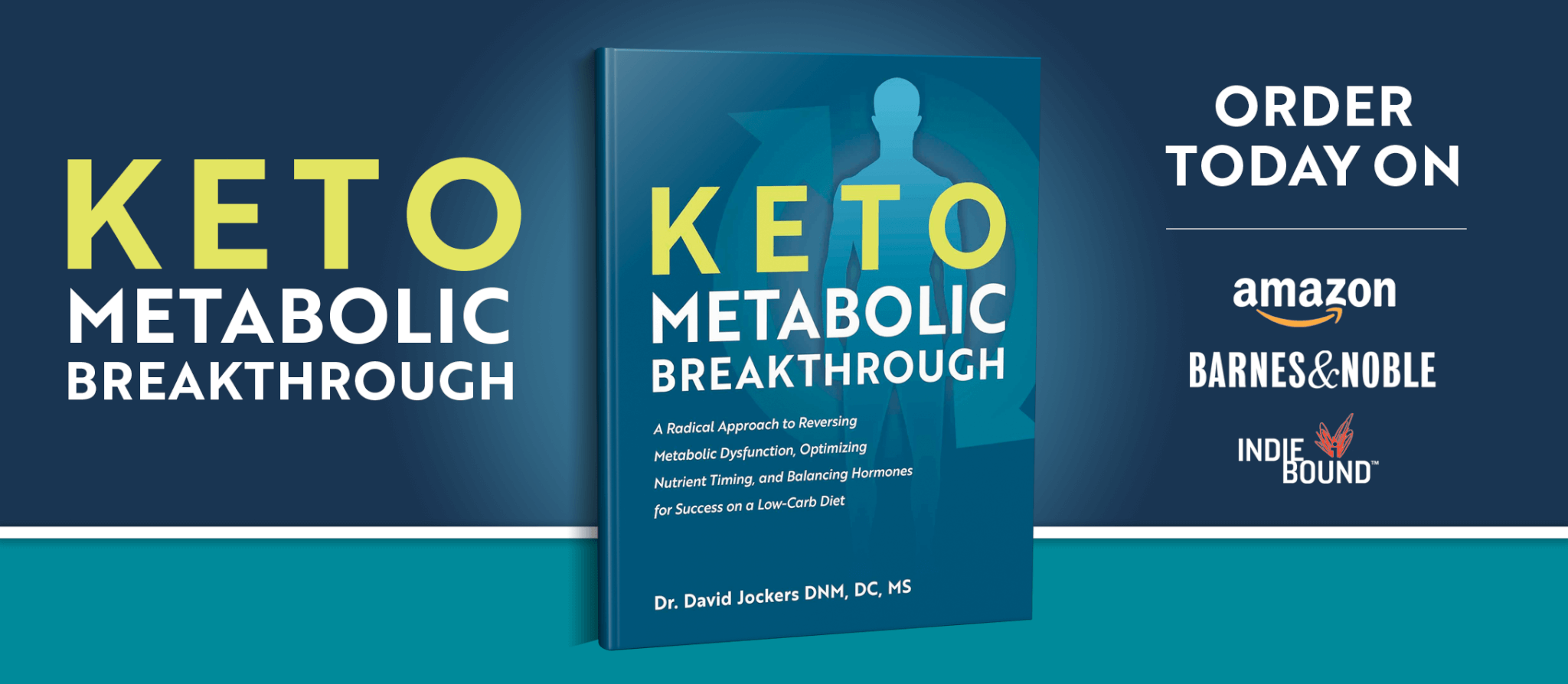
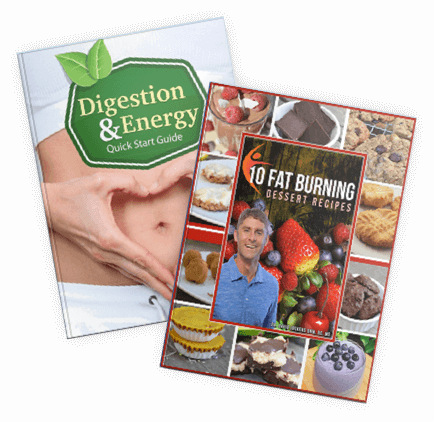

Hello my thioroid is overactive which is hyperthyroidism and iam loosing a lot of hair what can be done
So sorry to hear that! Here is a helpful article: https://drjockers.com/hyperthyroidism/